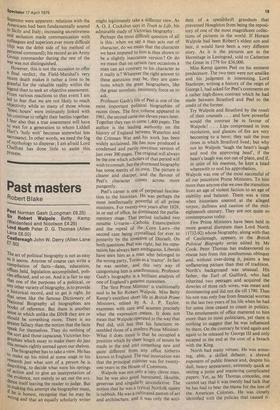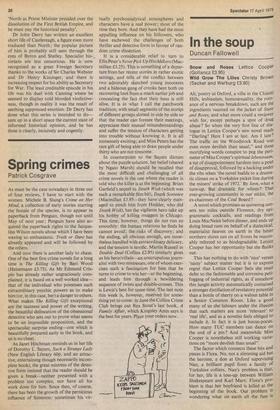Past masters
Robert Blake Peel Norman Gash (Longman £6.25) Sir Robert Walpole Betty Kemp Meidenfeld and Nicolson £4.25) Lord North Peter D. G. Thomas (Allen Lane 26.00) Castlereagh John W. Derry (Allen Lane 27.50) The art of political biography is not as easy as It seems. Anyone of course can write a compilation of facts—dates, education, 0.ffices held, legislation accomplished, policies effected, and so on. And it is fair to say that one of the purposes of a political, or any other variety of biography, is to provide a historical record, and to get it right. In that sense like the famous Dictionary of National Biography all biographies are books of reference. But there is another sense in which unlike the DNB they are or should be something more. There is no greater fallacy than the notion that the facts sPeak for themselves. They do nothing of the sort and those capacious Victorian biograPhies which essay to make them do just this remain rightly unread upon our shelves. The biographer has to take a view. He has to make up his mind at some stage in his research just what sort of a person he is describing, to decide what were his springs °f action and to give an interpretation of the evidence, not merely to set out the evidence itself leaving the reader to judge. But l.nmaking this attempt the biographer must, 'r he is honest, recognise that he may be wr°ng and that an equally scholarly writer
might legitimately take a different view. As
A. 0. J. Cockshut says in Truth to Life, his admirable study of Victorian biography : Perhaps the most difficult question of all is this: when we say a man acts out of character, do we mean that the character we have imputed to him is thus shown to be a slightly inaccurate version? Or do we mean that on certain rare occasions a man can act contrary to his character as it really is ? Whatever the right answer to these questions may be, they are questions which the great biographers, like the great novelists, insistently force us to ask.
Professor Gash's life of Peel is one of the most important political biographies of recent times. The first volume appeared in 1961, the second came out eleven years later. Together they run to some 1,400 pages. The author is the leading authority on the history of England between Waterloo and the Crimean War and his work has been widely acclaimed. He has now produced a condensed and partly rewritten version of just over 300 pages. The original will always be the one which scholars of that period will wish to consult, but the shortened biography has some merits of its own. The picture is clearer and sharper, and the flavour of Peel's character comes across more pungently. Peel's career is one of perpetual fascination to the historian. He was perhaps the most intellectually powerful of all prime ministers. For twenty-two years after 1828, in or out of office, he dominated the parliamentary stage. That period included two notable U-turns—Catholic Emancipation and the repeal of the Corn Laws—the second case being crystallised for ever to posterity by the invective of Disraeli. On both questions Peel was right, but his reputation has always been ambiguous. Liberals have seen him as a man who belonged to the wrong party, Tories as a 'traitor'. In fact he was neither, and this very way of categorising him is anachronistic. Professor Gash's biography is a brilliant analysis of one of England's greatest statesmen.
The 'first Prime Minister' is traditionally said to be Sir Robert Walpole. Miss Betty Kemp's excellent short life in British Prime Ministers, edited by A. J. P. Taylor, examines with care and acumen precisely what the expression means. It does not mean that Walpole operated in the way that Peel did, still less that his functions resembled those of a modern Prime Minister. What it does mean is that he occupied a position which by sheer length of tenure he made in the end into something new and quite different from any office hitherto known in England. The real innovation was that the principal minister was for twentyone years in the House of Commons. Walpole was not only a very clever man, but he was also good humoured, likeable, generous and singularly unvindictive. The notion that he was a typical Norfolk squire is rubbish. He was a cultivated patron of art and architecture, and it was only the acci
dent of a spendthrift grandson that prevented Houghton from being the repository of one of the most magnificent collections of pictures in the world. If Horace Walpole had been Robert's eldest son and heir, it would have been a very different story. As it is the pictures are in the Hermitage in Leningrad, sold to Catherine the Great in 1779 for £36,000.
Miss Kemp quotes Peel on his eminent predecessor. The two men were not unalike and his judgment is interesting. Lord Stanhope, writing a history of the reign of George I, had asked for Peel's comments on a rather high-flown contrast which he had made between Stratford and Peel to the credit of the former.
Try Walpole and Stratford by the result of their counsels . . . and how powerful would the contrast be in favour of Walpole! . . . Lips compressed in iron resolution, and glances of fire are very becoming to a hero; they suit the iron times in which Stratford lived; but why not let Walpole 'laugh the heart's laugh and nod the approving head', if the heart's laugh was not out of place, and if, in spite of his enemies, he kept a head wherewith to nod his approbation.
Walpole was one of most successful of all our peacetime Prime Ministers. To him more than anyone else we owe the transition from an age of violent faction to an age of stability and balance. There was a time when historians sneered at the alleged torpor, dullness and caution of the inideighteenth century. They are not quite so contemptuous today.
Few Prime Ministers have been held in more general disrepute than Lord North (1732-92) whose biography, along with that of Castlereagh, appears in the British Political Biography series edited by Mr Cook. Peter Thomas has endeavoured to rescue him from this posthumous obloquy and, without over-doing it, paints a less unflattering picture than that of tradition. North's background was unusual. His father, the Earl of Guilford, who had inherited two peerages and acquired the dowries of three rich wives, was mean and domineering and did not die till 1790. Thus his son was only free from financial worries in the last two years of his life when he had for some time ceased to count in politics. The emoluments of office mattered to him more than to most politicians, yet there is nothing to suggest that he was influenced by them. On the contrary he tried again and again to be released by George III and only escaped in the end at the cost of a breach with the King.
North had many virtues. He was amusing, able, a skilled debater, a shrewd exponent of public finance and, despite his dull, heavy appearance, extremely quick at seizing a point and mastering complicated papers. Yet, as Mr Thomas concedes, one cannot say that it was merely bad luck that he has had to bear the blame for the loss of the American Colonies. He was closely identified with the policies that caused it: 'North as Prime Minister presided over the dissolution of the First British Empire, and he must pay the historical penalty'.
Dr John Derry has written an excellent short life of Castlereagh, a figure even more traduced than North; the popular picture of him is probably still seen through the eyes of Byron and Shelley. Specialist his, torians are less censorious. He is now recognised as a great Foreign Secretary thanks to the works of Sir Charles Webster and Dr Henry Kissinger, and there is increasing respect for his ability as Secretary for War. The least creditable episode in his life was his duel with Canning where he seemed to display cold blooded vindictiveness, though in reality it was the result of seething suppressed emotion. Dr Derry has done what this series is intended to do— sum up in a short space the current state of informed historical opinion, and he has done it clearly, incisively and cogently.



































 Previous page
Previous page